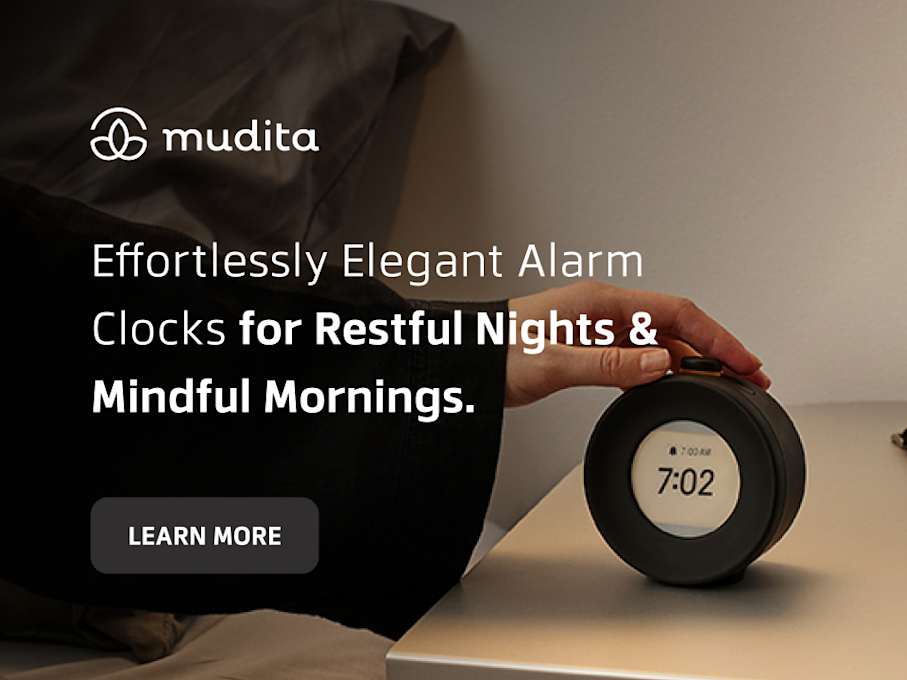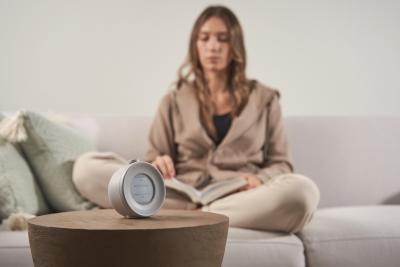
How to Reset Your Circadian Rhythm
Is Your Internal Clock Out of Sync?
Have you ever been wide awake at 3 AM, staring at your phone, wondering why sleep seems so elusive?
Or perhaps you’re the one fighting to stay awake during an important afternoon meeting, despite drinking a double espresso right before.
If these scenarios sound all too familiar, your internal clock might be out of sync.
Yes, welcome to the world of the disrupted circadian rhythm! But the good news is, there's a way to reset it.
And Mudita’s here to help. Let’s start with the basics.

Mudita Harmony 2
What is a Circadian Rhythm?
A circadian rhythm is a natural process that occurs in all living things on a daily basis. It is the internal clock that controls the sleep-wake cycle and other body functions, including digestion and hormone release. Circadian rhythms have been found in many different organisms, ranging from plants to insects to mammals.
There are two phases to this cycle: the sleep phase and the wake phase. These two phases combine to keep humans awake during daylight hours, then help us get adequate rest at night.
The human body's internal clock controls this rhythm by sensing ambient light levels and adjusting hormones accordingly. For example, suppressing melatonin production during daylight hours so we can stay awake longer without feeling sleepy; increasing melatonin production at night in order to promote drowsiness and facilitate sleep
Mudita Bell in velvety Charcoal Black available at Mudita.com
How does your internal clock work?
The circadian rhythm is a biological clock that regulates many physiological processes, including the sleep-wake cycle and other behaviors.
Our circadian rhythms are influenced by light and darkness, so they're regulated by a part of the brain called the suprachiasmatic nucleus (SCN).
The SCN receives information on whether it's light or dark outside (in order to adjust our internal clocks) from specialized cells in our eyes called rods and cones.
You can thank these two types of cells for helping you see properly during daylight hours when it's important for survival, since rod cells work well at night when we don't need them much anyway!
How does our circadian rhythm affect sleep quality?
When we talk about the circadian rhythm, we talk about light and dark as well. When it's light out, our bodies produce melatonin (the hormone that makes you sleepy). As soon as it's dark, that stops happening. If you're sleeping in a room with a lot of light or no curtains on your windows and someone has left the TV or lights on while they're sleeping, or if there are street lights outside, this can prevent your body from producing enough melatonin to help you fall asleep quickly and stay asleep throughout the night.
You might remember reading about circadian rhythm when we wrote about jet lag in an earlier article on our blog. That’s because when our body travels across time zones, our clocks get out of sync with what time it actually is where we�’re going (and vice versa).
The same thing happens when you go to bed later than usual on a work night because of an extra-long Netflix binge session; eventually, after staying up too late for too many nights in a row, all these extra hours will catch up with you!

Common Disruptions to Your Circadian Rhythm
Unfortunately, modern life often throws a wrench into this finely-tuned system. Some common culprits include:
Jet lag: Nothing confuses your body clock quite like jumping time zones.
Shift work: Night owls by necessity, not by nature.
Netflix binges: "Just one more episode" can lead to a cascade of sleep disruptions.
Inconsistent sleep schedules: Your body craves routine, even on weekends.
Blue light from screens: Late-night scrolling tells your brain it's still daytime.
Consequences of a Disrupted Circadian Rhythm
A misaligned circadian rhythm isn't just about feeling groggy. It can set off a chain reaction of health issues:
Insomnia or poor sleep quality
Daytime fatigue that rivals a zombie's
Mood swings that would put a rollercoaster to shame
Difficulty concentrating (Was I supposed to remember something?)
Increased risk of more serious conditions like depression, obesity, and even certain cancers
READ: Effects of chronic sleep deprivation on health & well-being
A Simple Guide To Resetting Your Body's Internal Clock
If you’re an erratic sleeper or a night owl, you can reset your circadian rhythm and reclaim your rest. Here's how:
Embrace the sun: Morning light exposure is your secret weapon. Aim for at least 30 minutes of natural light soon after waking.
Consistency is key: Try to sleep and wake at the same time, even on weekends and holidays. Your body will thank you.
Create a sleep sanctuary: Keep your bedroom cool, dark, and quiet. Think of it as a cave for your inner bear.
Ditch the screens: The blue light from devices is kryptonite for your sleep. Try reading a book instead of scrolling before bed. Better yet, create an offline bedtime routine to get your body and brain ready for sleep.
Watch what you eat (and when): Late-night snacks can confuse your body clock. Try to finish eating a few hours before bedtime. Also, avoid caffeine and alcohol before bed.
Exercise, but time it right: Regular physical activity can help regulate your rhythm, but avoid intense workouts close to bedtime.
Resetting Your Circadian Rhythm is Your Ticket to Better Sleep and Brighter Days
Resetting your circadian rhythm isn't just about getting better sleep (although that's a fantastic benefit). It's about aligning your entire body with the natural rhythms of the world around you.
By making a few simple changes, you can transform from a bleary-eyed, caffeine-dependent mess into a well-rested, energetic version of yourself.
Remember, your body is an incredible timekeeper. Sometimes it just needs a gentle nudge to get back on track.
So, are you ready to reset your circadian rhythm and get a better night’s sleep?
To learn more about the intriguing subject of sleep, check out our Sleep Better resource page where we write extensively about the importance of sleep and the positive impact a good night’s rest has on our health and overall well-being.
If you would like to read more articles about the importance of sleep, rest & relaxation, check out these additional articles:
Also consider joining our Mudita Community on our forum.
Related stories

The Power of Wellness: 5 Research-Based Reasons of Self-Care
Self-care is a deliberate activity that you do to take care of your mental, physical, and emotional health.

Does Sunshine Make Us Happier?
Discover the remarkable influence of sunshine on our health and happiness & learn how the sun's rays contribute to our overall well-being.

Transform Your Day with These Simple Wellness Practices
Revitalize your daily routine with these simple wellness practices & embrace a healthier, more joyful life with Mudita's innovative products.
If you'd like to receive the best stories from our blog, keep up to date with our progress and get notified about our product releases and special discounts.